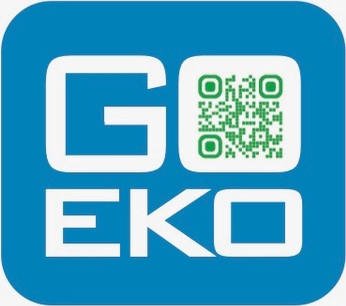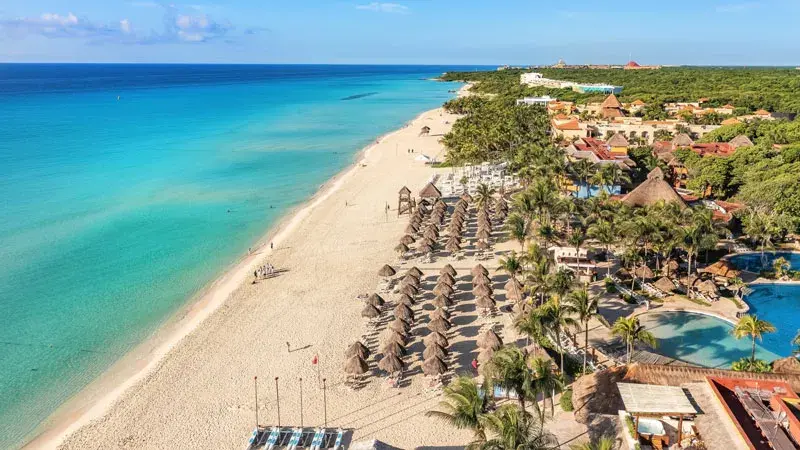The hospitality industry is standing at a fascinating crossroads. Once defined by opulence, scale, and service, it now finds itself judged by a new metric: impact. The term sustainable hospitality has shifted from a niche concept for boutique eco-lodges to a core operational strategy shaping how Europe’s largest hotel groups design, manage, and communicate.
And yet, the irony is striking — the most sustainable hotels aren’t necessarily the ones that shout the loudest about it. They’re the ones quietly tracking every kilowatt-hour, every liter, every ton of waste — and turning those numbers into competitive advantage.
In other words, sustainable hospitality isn’t about green talk. It’s about smart operations.
What sustainable hospitality really means — and why it’s redefining the industry
Before diving into metrics, regulations, or ROI, it’s worth pausing to define the concept we’re all talking about — sustainable hospitality.
At its core, it’s the integration of environmental responsibility, social consciousness, and economic viability into the DNA of hotels, resorts, and tourism operators. It’s not a department, nor a marketing slogan. It’s a management philosophy that treats sustainability as a value creation engine, not a cost center.
A truly sustainable hotel:
- Protects environmental resources, through energy and water conservation, circular design, and waste reduction.
- Respects social ecosystems, by supporting local employment, fair supply chains, and inclusive community initiatives.
- Remains economically resilient, optimizing operations and protecting profitability through efficiency and innovation.
It’s the practical application of the triple bottom line: people, planet, and profit — measured, not merely mentioned.
This is why European policymakers and global certification bodies (like BREEAM, LEED, or GSTC) now treat sustainability as a quantifiable business performance metric.
And let’s be honest — in an era of rising energy costs, supply chain volatility, and growing regulatory pressure, sustainable hospitality isn’t “nice to have.” It’s the only business model that still makes sense.
The counterintuitive truth: sustainability in hospitality is an operations discipline (not a branding exercise)
There’s a dangerous myth that sustainability belongs to marketing. In reality, it lives and dies in operations.
Every sustainability director I’ve worked with across Europe — from Portugal to Poland — tells the same story: their biggest wins came not from new technologies, but from smarter habits and better data.
Let’s put numbers on it.
According to Cornell Hotel Sustainability Benchmarking (2024), the average European hotel uses around 274 kWh/m² per year. The top 25% of performers cut that down to under 200 kWh/m² — without any loss in guest comfort. The difference? They measure everything.
No data, no management. No management, no savings.
Sustainable hospitality, then, is the art of operational empathy: understanding where energy leaks, why food waste happens, and how small design decisions (like water pressure or light sensors) can ripple into thousands of euros saved annually.
It’s methodical. It’s technical. And yes — it’s good business.
The European context: EPBD, CSRD, and anti-greenwashing rules hotels can’t ignore
Europe isn’t just nudging — it’s legislating.
The Energy Performance of Buildings Directive (EPBD), recast in 2024, now requires deep energy renovations across all sectors, including hospitality. Hotels must track and improve building performance — insulation, HVAC efficiency, renewable integration — under the same lens as office towers or public buildings.
Then comes the Corporate Sustainability Reporting Directive (CSRD). For hotel groups crossing reporting thresholds, sustainability data must now be reported, auditable, comparable, and assured. That means sustainability in hotel management can no longer rely on intuition — it needs solid metrics, digital systems, and governance.
Finally, the Empowering Consumers Directive (EU 2024/825) sets a new line in the sand: vague “eco-friendly” or “green” claims are illegal unless proven. That’s the end of soft language and unverifiable labels.
In short, the EU has made sustainable hospitality measurable. If you can’t prove it, you can’t claim it.
Five sustainable practices in the hospitality industry that actually pay back
The beauty of sustainability in hospitality is that the most responsible measures are often the most profitable.
Let’s explore five proven practices transforming the European market.
Energy and water conservation: where efficiency meets profitability
Energy efficiency remains the foundation of every sustainability strategy. Think of it as the “invisible renovation” — less glamorous than a rooftop solar array, but far more powerful in ROI.
LED retrofits cut lighting use by up to 80%, and intelligent HVAC systems deliver 6–12% energy savings with sub-two-year paybacks. Smart meters reveal wasteful nighttime loads, enabling quick behavioral fixes before big investments.
Water tells a similar story.
Pressure regulators, low-flow showers, and laundry optimization can save tens of thousands of liters per year — especially in water-stressed regions like southern Spain or the Greek islands. It’s not just sustainability; it’s survival economics.
Waste reduction in food & beverage: smarter kitchens, higher margins
The sustainability in the food and hospitality industry starts in the kitchen. Food waste accounts for 8–10% of global emissions — and it’s money thrown away.
Iberostar Hotels & Resorts used AI-driven monitoring to cut food waste by 28% across its portfolio. The result? Lower costs, lower emissions, and happier chefs.
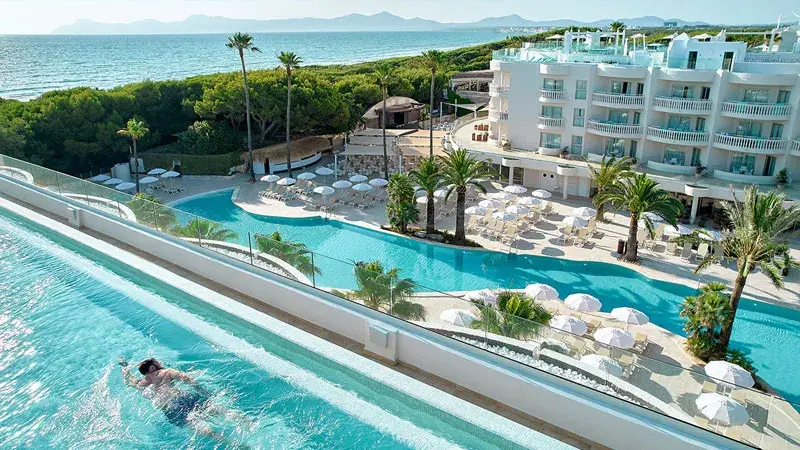
The lesson: the path to sustainable hotel profitability often begins in the buffet line.
Responsible sourcing and circular hospitality
Circularity is reshaping the hospitality supply chain. From refurbished furniture and recycled materials to local food sourcing, hotels are redesigning procurement around longevity and traceability.
Circular hospitality doesn’t just reduce waste — it builds storytelling power. Guests remember a bar counter made from reclaimed wood or uniforms made from ocean plastics far more than they remember a slogan on a wall.
Guest engagement and green transportation
Modern travelers expect to participate in sustainability, not just observe it. The key? Make the sustainable choice the default.
Automated room sensors that switch off cooling when windows open, refill stations that replace plastic bottles, or EV charging bays visible from the lobby — all small nudges with big perception impact.
Booking.com’s Sustainable Travel Report 2024 revealed that 75% of European travelers want to travel more sustainably, and 54% intend to use more sustainable modes of transport when traveling in the future.
Smart sustainability management systems: turning data into proof
Behind every “eco” claim should be a dashboard.
Modern hotel management systems now integrate EUI, water-per-guest-night, and waste intensity metrics, exporting them directly into CSRD-ready reports.
This isn’t bureaucracy — it’s the backbone of credibility. Because in sustainable hospitality, data equals trust.
Hotel Sustainability Case Studies with Real Numbers
In my experience working on infrastructure projects, nothing convinces a boardroom faster than verifiable data. Here are two hard-won lessons from the European market that show sustainability and hospitality work together:
A Lesson from Greece: Cutting Carbon to Stay Competitive
The Costa Navarino complex in Messinia, Greece, didn’t just tweak its operations; it rewrote the manual. Between 2019 and 2022, the destination achieved an inspiring 80% reduction in carbon emissions. How? Through massive, integrated efforts that also included planting over 7,000 olive trees and setting a goal to cut water intensity by 15% by 2025. This European luxury resort case study shows that large-scale luxury hotel operations can be compatible with sustainable hospitality best practices — backed by real metrics.
A Hard-Won Lesson in Italy: The Value of Hyper-Local Green Branding
Look at Naturhotel Leitlhof in Italy. It has repeatedly won “Europe’s Leading Green Hotel” – most recently in 2024. This kind of consistent, verified recognition allows hotels with green certifications to achieve a Revenue Per Available Room (RevPAR) premium of up to 11% over their non-certified competitors.
Travelers notice, and they care. In fact, 70% of consumers globally say they would pay more for environmentally responsible options. You can’t put a price tag on that brand equity—or wait, you can: it’s up to an 11% RevPAR premium.
Barcelona & Ibiza — two islands of proof
Nobu Hotel Barcelona achieved BREEAM “Excellent” with a record-breaking 78.79% — the highest rating ever given to a hotel in Spain. By upgrading façade insulation, installing smart lighting, and optimizing HVAC and water systems, Nobu cut electricity by 29%, gas by 23%, and water by 16%, all while increasing occupancy.
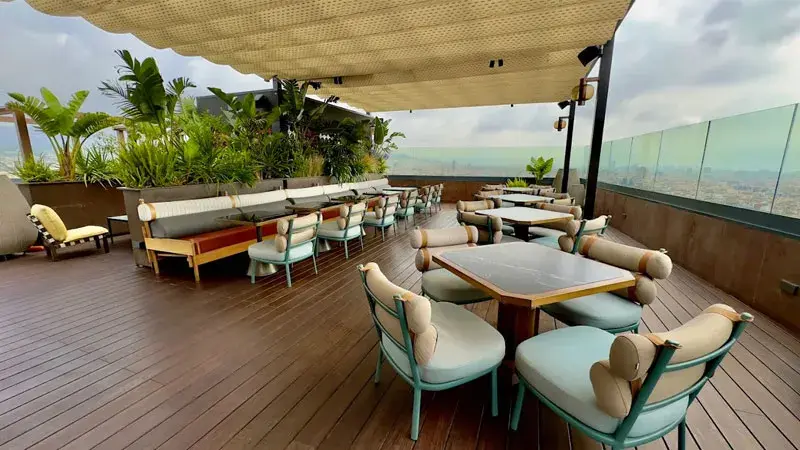
A few hundred kilometers away, Six Senses Ibiza took a different path: geothermal cooling, solar panels, and automated irrigation. The payoff: 40% fewer CO₂ emissions and 24 million liters of water saved annually.
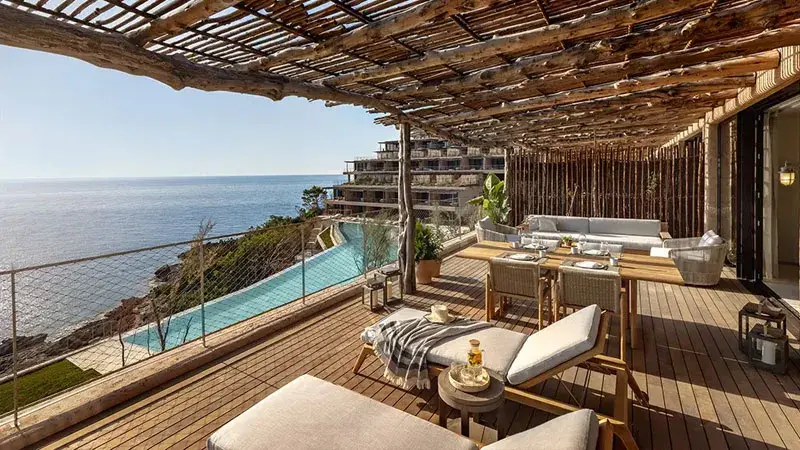
Both hotels prove the same point — sustainability and hospitality can absolutely coexist with profitability.
As WTTC data confirms, global tourism’s climate footprint has declined from 2019 while revenues have rebounded. Sustainable practices no longer slow business — they scale it.
Myth-busting: sustainability doesn’t cost more — mismanagement does
Let’s kill one myth for good: sustainability isn’t expensive. Inefficiency is.
When European hotels approach sustainability incrementally — upgrading as part of regular capex, leveraging EU green finance, or bundling energy retrofits — the business case becomes obvious.
Think of it this way: investing €1 in prevention today avoids €2–3 in penalties, inefficiencies, or rushed compliance tomorrow.
The upcoming EPBD targets and CSRD reporting make early movers not just virtuous, but strategically smarter.
The smartest hoteliers treat sustainability like sound engineering — they don’t flip a switch, they fine-tune dials. The result? Consistent performance and long-term resonance.
Tools, frameworks, and references shaping sustainable hospitality
A few essential anchors for anyone building a credible sustainability roadmap:
- BREEAM / LEED — global certifications aligning assets to measurable criteria.
- GSTC — sustainability standards for tourism and hospitality.
- HOTREC Net Zero Hospitality Roadmap — guidance tailored for European hotels, including SMEs.
- Cornell Hotel Sustainability Benchmarking Index — global EUI and water benchmarks.
- Carbon Trust and European Investment Bank — technical and financial frameworks for retrofit programs.
- WTTC Net Zero Roadmap (2024) — a must-read for aligning goals to industry pathways.
Together, these tools define the new grammar of sustainability in hospitality — measurable, auditable, and operational.
Circular Hospitality and the Future of Asset Value
When you commit to circular hospitality, you’re not just saving the planet; you’re saving the building from becoming an obsolete liability. This brings me to an unexpected concept: Hotel sustainability is like estate planning for property assets.
Ignoring sustainability today is like buying a house without clear title; it diminishes its value at the point of sale. Assets without significant sustainability practices in the hospitality industry are increasingly facing a disadvantage at disposition and may have to sell at a discount. The market is now factoring ESG risks into valuation.
This is the principle behind the “reuse and re-sell” model:
- Waste-to-Resource: Companies like Marriott International saved over $14 million annually by switching from single-use toiletry bottles. This simple change dramatically reduces hotel waste expenses.
- Food Waste Intelligence: Using AI to analyze and reduce food waste can save thousands of meals—and the associated procurement costs—as demonstrated by a specific Iberostar resort property in Spain.
Specific Next Steps for Driving Sustainable Hotel Profitability
Stop treating sustainability as a cost center. It is an engineering challenge with a clear financial solution.
The goal isn’t just to be “green.” It’s to be resilient, compliant, and profitable in a market that rewards demonstrable excellence in hotel sustainability in hospitality.
Drop your toughest question about securing green energy funding for your next hotel renovation in the comments. We’ll break down the financial engineering required.
👉 Ready to start? Explore GoEko’s platform to identify cleantech solutions, compare ROI scenarios, and connect with financing partners.
FAQ: sustainability in tourism and hospitality — the quick answers hoteliers ask
What is a sustainable hotel?
A sustainable hotel integrates environmental strategy, economic resilience, and social impact into its daily operations and management — measuring its footprint and reporting transparently.
Which sustainability practices deliver fastest ROI?
Energy retrofits, water management, waste monitoring, and staff training typically pay back within two years — long before reputation dividends even begin.
How can I measure sustainability in my hotel?
Use kWh/m²/year (EUI) and water-per-guest-night as core KPIs. Cleantech providers in the GoEko platform can help you measure CO2 emissions or water consumption.
Do guests really care?
Absolutely. Guests reward authenticity and convenience. Sustainable travel is no longer a trend — it’s a filter in booking behavior.
How can small hotels keep up with regulations?
Start small. Focus on measurable improvements (lighting, HVAC, water). Then document everything. Proof beats promise every time.
Citations used in-article
- EPBD 2024 recast & EC energy pages.
- EU anti-greenwashing (Empowering Consumers Directive 2024/825).
- WTTC climate footprint drops (2023–2024).
- Booking.com 2024 sustainable travel demand (GSTC overview).
- EUI framing & benchmarks.
- Carbon Trust paybacks
- LED savings & smart HVAC impact.
- Case studies: Nobu Barcelona, Six Senses Ibiza, Iberostar AI food-waste
- Article in High End Hospitality.
- Article in La voz de Ibiza.
Daniel has 20 years of experience in business and financial journalism, having worked in Zurich, Tokyo, Buenos Aires, and Mumbai. Over the years, he has covered start-ups, cleantech, and the Swiss construction sector in depth.
Deeply concerned about environmental issues and fully aligned with Raphaël’s vision of making the ecological transition more accessible and impactful for companies, he joined the project and co-found GoEko alongside him.
